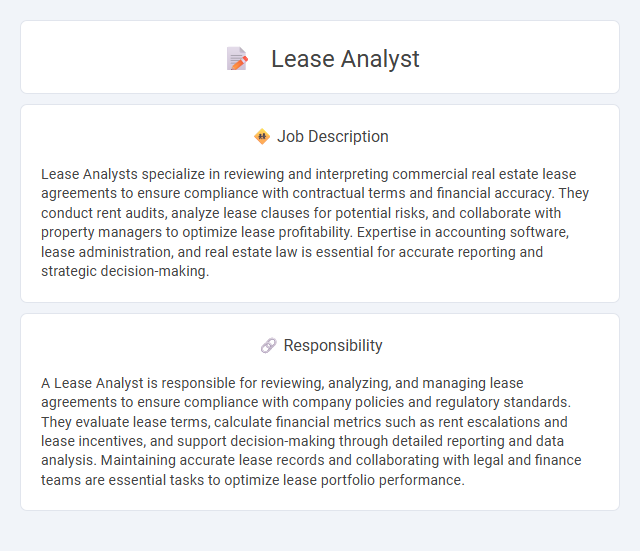
Lease Analysts specialize in reviewing and interpreting commercial real estate lease agreements to ensure compliance with contractual terms and financial accuracy. They conduct rent audits, analyze lease clauses for potential risks, and collaborate with property managers to optimize lease profitability. Expertise in accounting software, lease administration, and real estate law is essential for accurate reporting and strategic decision-making.
Individuals with strong analytical skills and attention to detail are likely suited for a Lease Analyst position, as the role requires evaluating lease agreements and financial data. People who thrive in structured environments and have a methodical approach to problem-solving may perform well given the job's demand for accuracy and compliance monitoring. Those lacking patience for repetitive tasks or struggling with data interpretation might find this role less suitable.
Qualification
A Lease Analyst requires strong expertise in property management, lease accounting, and financial analysis, including proficiency with ASC 842 and IFRS 16 standards. Candidates must demonstrate advanced skills in data interpretation, contract review, and lease portfolio management, utilizing tools such as MS Excel and lease management software. A background in finance, real estate, or accounting, combined with CPA or relevant certification, enhances job qualification and career advancement opportunities.
Responsibility
A Lease Analyst is responsible for reviewing, analyzing, and managing lease agreements to ensure compliance with company policies and regulatory standards. They evaluate lease terms, calculate financial metrics such as rent escalations and lease incentives, and support decision-making through detailed reporting and data analysis. Maintaining accurate lease records and collaborating with legal and finance teams are essential tasks to optimize lease portfolio performance.
Benefit
Lease Analyst positions likely provide significant benefits such as enhanced expertise in financial reporting and lease compliance, which can improve career prospects in real estate and finance sectors. There is a strong probability that the role offers exposure to advanced software tools and regulatory standards, increasing professional value. Opportunities for collaborative work with cross-functional teams may also result in improved communication skills and expanded industry networks.
Challenge
Lease Analyst roles likely involve the challenge of accurately interpreting complex lease agreements and financial data to ensure compliance and optimize asset management. Professionals may face pressure in analyzing variable lease terms and reconciling discrepancies across multiple contracts. The demand for precise forecasting and risk assessment could further complicate decision-making processes in this position.
Career Advancement
A Lease Analyst plays a critical role in managing and interpreting lease agreements, ensuring compliance and optimizing financial performance for organizations. Mastery of lease accounting standards such as ASC 842 and IFRS 16 opens pathways to senior positions like Lease Manager or Real Estate Portfolio Analyst. Continuous professional development and gaining expertise in advanced financial modeling and property law significantly enhance prospects for career progression in corporate real estate or asset management sectors.
 kuljobs.com
kuljobs.com